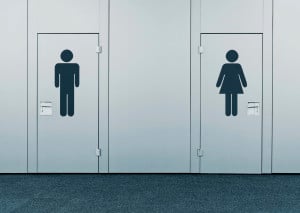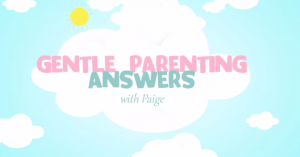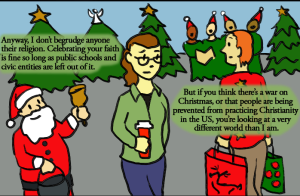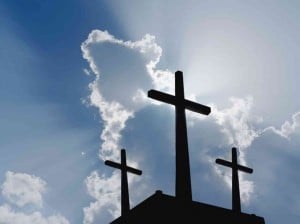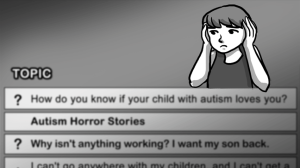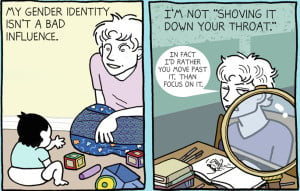
A young student holds up a pepper plant while smiling into the camera. Students in the background are out of focus, using gardening tools.
Environmentalism, even in name, is an overwhelming subject.
The concept seems to refer to a tremendous range of places and statuses – everything from air quality to deep oceans to the survival of miniscule bacteria, to public policies about sustainable building to product bans – in your own home, but also literally everywhere else in the entire world.
Not only that, but it’s also daunting: You fight to invest funds to have elementary schoolers in your town learn about re-using plastics, but then learn that there are entire cities that don’t have residential recycling programs. You work to pass an injunction to save 10% of a forest tract from logging in a forest you love, but then you learn about palm oil deforestation.
I’ve struggled with the hopelessness and anxiety of not knowing where to start combatting climate change and ecological waste for a long time. But in the last several years, I’ve learned a lot, and have become keenly aware of how environmental efforts stemming from the West can be a troubling force in communities around the world.
Oftentimes, well-intentioned efforts that send volunteers or workers from the United States out into other countries end up doing more harm than good, and replicate the patterns of power in the history of colonization. And where I live, many of the environmental vanguards are led by a privileged class of people.
Of course I’m happy to have those folks on board with the project of not destroying the planet – everyone should be a part of that overarching effort! However, when the sustainability issues that often dominate discussion seem to be focused on assuaging the moral conundrums of white, upper-middle class Whole Foods shoppers more than they’re focused on preventing toxic drinking water in rural indigenous communities, then we have a problem.
Our global climate problems can’t be saved by privileged people riding their bike to work or bringing their own canvas bag for groceries. Not that those aren’t meaningful things to do – but we have to realize that environmental problems are intersectional ones. And in order to start working toward a future where we get to drink water and breathe air on earth, we have to dig deeper.
We need to look at environmental catastrophes and conflicts through the lenses of race, capitalism, gender, colonization, and other forms of institutional power. And I know – I’m sure that seems daunting, too! But that’s okay – because we have to start somewhere.
I’m writing this article because I want you to start paying attention to local environmental policies, activists, and laws wherever you live. My home is in Oregon, in the western United States, so my environmental focus is often on things like timber sales, predator reintroduction, and cattle grazing. My perspective will reflect that, because I think it’s important to speak from where you are, and to fight to better the place that you call home.
If you’re in the United States, I encourage you to look at the measures and lawmakers on the ballot in your district in the upcoming election, even if you’re not of voting age yet, or don’t have had the right to vote taken away from you.
Is there a possibility of a new carbon tax? A senator up for re-election who wants to focus on lowering emissions? Learn about what the local issues are, and then read about them critically before developing a stance. How will these laws or the future decisions of these policy-makers affect the most vulnerable people in your state or community?
Then, after voting: Don’t stop.
Find an organization fighting for the environmental issues that ignite you the most, and volunteer or show up to a rally. If you start to notice that nobody is really talking about how environmental issues intersect with race, gender, and class, start pointing it out, or asking questions, or proposing projects about those very things.
Each one of the concepts I’m about to go through is a giant and endlessly complicated issue in its own right, and there’s so much more to discuss. But this basic outline can be a jumping off point to help you start to think about these relationships – and then start to apply new rigor to your activism in your own community.
1. The History of Colonization Shapes Our World
It’s easy to think about the “environment” in the way that we’ve been taught to think about it – as something composed of non-human things making up the “natural” world: rivers! oceans! rainforests! But if we press a bit, lines between the “human” world and the realm of nature begin to blur.
If we think about history with that idea in mind, we can start to see that the movements and societies of people actually developed the shape of the landscape and environment that we exist in now. And European colonization played an enormous role in shaping our current environment – and how we talk about it and see it.
Think about how natural it seems to have borders between countries, states, or territories dividing up the actual land that we all move around on, and all of the complicated centuries of decisions and forces that converged together to build that world. And then, think about all the borders between national forests or state forests or private timber land or ranches.
Where I live, in the western United States, we grow up learning about the history of our country as the history of Manifest Destiny: Bold pioneers struggled and carved their way across a vast, empty wilderness, inventing civilization with every step.
We tend to gloss over and actively erase the civilizations that already existed here prior to that. And we tend to simply rename colonization as “pioneering,” glamorizing and lionizing its actual violence and violations.
The European American settlers who carried out the slow struggle of imperialism did so in large part by crafting new ideas about what it meant to own land at all. Staking out fences, electing geographically based governments that depended on borders, raising cattle and sheep in large numbers, and privately growing crops for commercial use fundamentally altered the way the humans living here cooperated and clashed with the rest of the ecosystems.
That leaves us in a present state of seemingly everlasting conflicts between the needs of cities, agrarian communities, and the wild things that creep out from the edges of the forest.
Our history of colonization created the world and the conflicts that we live with now. That means that the struggles we have about what to do with land are intrinsically tied to the historic struggle to disinherit the earth from indigenous people.
And when we think about how we want to stop logging old growth forests or proclaim a national monument or change laws that let cattle graze on federal forestland, we need to widen our perspective. We have to realize that our institutions and systems of land management were not built to coexist with predators, indigenous people, or anything and anyone expect for the dominant classes of a white-supremacist capitalist patriarchy.
Therefore, if we want to stop the world from imploding into roiling piles of burning plastic garbage and hemorrhaging oil wells, we have to be willing to talk about our environmental issues as social justice issues – and we must also come to terms with the fact that we’re gonna have to change some really big stuff to turn this ship around.
2. The Environment is Built with Language
In the beginnings of the environmental movement in the late 19th and early 20th centuries, folks like John Muir and Theodore Roosevelt did incredible work to preserve and protect vast tracts of land.
But the romantic rhetoric of the “wilderness” – those wild sacred places that were suddenly essential to American character and simultaneously in dire threat of disappearing – often relies on words with a lot of baggage.
The idea that we should put a halt to indiscriminately plowing every single forest into factory fuel wasn’t, of course, a bad thing. But the continued presentation of “wildernesses” as places untouched by “civilization” holding primeval secrets and providing special access to primitive, ancient knowledge has been a part of the huge cultural idea that “society,” “civilization,” and “people” are words that actually only refer to white people.
Acting like the “wilderness” is something that is necessarily “untouched” by people furthers the fantastical myth that the “new world” was just a big, old, empty wasteland waiting to get discovered by fancy Europeans in the 16th century.
In addition, you won’t get very far into a national park gift shop or a book of inspirational nature quotes without running across words like virgin and pure. Those phrases not only tie into the emptiness myth that dehumanizes indigenous people, but they also associate the American wilderness with myths and constructs of American womanhood.
Gendering the landscape as a passive receptacle for manly penetration and conquering doesn’t help women.
Going forward, we should work to untangle conservation efforts from language that relies on gendered binaries and power imbalances to gain traction. And we shouldn’t keep insisting on the idea that the only gorgeous, powerful, and meaningful kinds of nature are ones that are tucked deep and far away, where only certain people have the ability to visit them.
3. Class Impacts Our Relationship to the Environment
As I wrote about above, the story of land use in the United States is a story of imperialism and settler-colonization. That process of land privatization set up a world in which people who already own land influence how governments decide to regulate land use and policy.
People who don’t own land, and who have little capital power elsewhere also, do not have that kind of influence over use of that land. And yet, they (we) must still live in the same world of ecosystems, where changes proliferate far beyond borders and fences.
The public lands system in the United States – comprised of forests, parks, wild areas, and other places with a complicated litany of designations and rules – is supposed to protect us from this kind of disenfranchisement.
But those public lands are continually disputed, debated, and used as bargaining chips.
Recent political movements have begun using the very idea of public lands as a galvanizing issue for the new “alternative right,” and I worry that one of the greatest social assets for America’s progressive potential – our stake in public land – is at risk.
Who owns the land often gets the biggest say in what we can do with the land – and it’s not fair. Especially because what we do with the land often involves harmful industrialization and pollution, which, in turn, end up hurting people who are already dealing with disproportionate social burdens.
For example, women in rural places or low-income women often face the brunt of the costs of pollution and lack of sustainable choices. However sometimes policies that seem genuinely simple and straightforward, like plastic bag bans, might end up putting the most pressure on the daily lives of somebody trying to get groceries on their way home from work on the bus.
Of course, in many communities, activists and policy makers have come up with lots of solutions to offset those imbalanced costs and pressures. But it’s still important to try and think about those perspectives when you imagine what environmental policies should look like – especially since the people who are usually designing, creating, and enforcing those laws and policies are operating from considerable positions of power and privilege already.
In recent years in Oregon, there have been increasingly strained relationships between folks who are struggling to live and work in rural places, but feel underrepresented in government and economically disempowered.
Those feelings are then exploited by measures and elections that require these voters to choose between public school funding and forest preservation, or good ecosystems and their family’s ability to keep their heads above water financially.
Imposing reductive, harmful decisions like that drives a false wedge between people who are able to identify as environmentalists – the liberal urban elite, supposedly – and those who actually live outside of the support systems of cities.
Unnecessary political divides don’t help any of us in our fight for a viable, sustainable future. And we can’t force marginalized people to make choices between selling off public land and funding the social programs necessary for survival.
These divisions are not unbridgeable. The first step is for us to realize that the desires of environmentalists are not opposed to the desires of labor advocates, or anti-racist movements, or rural workers and families. And if we want to be on the same side, we need to act like it.
***
What initially seem like basic environmental conflicts, in actuality, revolve around land ownership, capital power, and centuries of violence.
Without doing serious work to start unlearning the principles of capitalism that simultaneously rely on inequality and encourage exploitation, extraction and destruction, we won’t really be confronting our major climate and ecological crises.
It’s hard and overwhelming, of course, but once we start looking at the intersections of environmental degradation and other systems of oppression, I think it’s possible to start seeing more interesting and exciting solutions that can sustain, empower, and uplift all people, along with the ground and the earth they live their lives on.
[do_widget id=’text-101′]
Kimberly Fanshier is a writer, activist, scholar, and queer feminist outlaw from the Willamette Valley. She is currently working on a book about the hidden histories of country music. Follow Kimberly Fanshier’s explorations of wolves, witches, and the west at her website or on Instagram @kimberlyfanshier.
Search our 3000+ articles!
Read our articles about:
Our online racial justice training
Used by hundreds of universities, non-profits, and businesses.
Click to learn more







